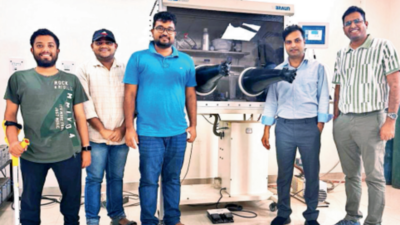- News
- Technology News
- Times Techies News
- Making better, cheaper batteries with silicon anodes
Trending
Making better, cheaper batteries with silicon anodes

Ashwani Pandey (extreme right), and Soobhankar Pati (second from right) with IIT Bhubaneswar students in their lab
➤ Earlier this year, Cellark, which is based in Cuttack, Odisha, received a grant of Rs 1.7 crore from the Union mines ministry to start pilot scale production (25kg/day) of the silicon material. It was one among five startups to get this grant. Previously, Cellark also received seed funding from IOCL.
➤ Soobhankar, associate professor at IIT Bhubaneswar, was the driving force of the startup. After returning from the US in 2013, he embarked on a mission to tackle the issue of energy storage, focusing on enhancing the energy density and reducing costs of lithium-ion batteries.
➤ Lithium-ion batteries consist of several components including cathodes, anodes, separators, and electrolytes. These components are arranged in layers within the battery architecture, which are then rolled or stacked together to form a compact and efficient energy storage device. “However, despite their efficiency, lithium-ion batteries face limitations in terms of cost and energy density. Constant innovation in raw materials for anodes and cathodes remains imperative,” says Soobhankar.
➤ Collaborating with PhD students, Soobhankar explored silicon anodes for lithium-ion batteries, aiming to surpass the limitations of conventional graphite anodes.
➤ The initial lab results were promising and so he partnered with his student Ashwani to start Cellark in 2018 to translate the lab-based innovations into commercial solutions. Cellark’s proprietary technique stabilises porous silicon for optimal battery application.

About the Author
Hemanta PradhanEnd of Article
Latest Mobiles
FOLLOW US ON SOCIAL MEDIA
Hot Picks
TOP TRENDING
Explore Every Corner
Across The Globe
CSK Full SquadMI Squad Projected 11IPL Most Expensive PlayerVaibhav SuryavanshiCKS Squad Projected 11
IPL Teams SquadsIPL AuctionIPL 2025 Mega Auction Players ListIPL Auction Unsold Player ListPBKS IPL Team Player List